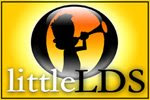Tip#11: Project into the future & plan ahead – Ask yourself where you’ll be this time tomorrow. What can you do NOW to be prepared for THEN? What about a week from now? A month from now? A year? 5 years? What about at retirement? Plan ahead and make preparations for your future and for the future of your family. (This could be a segment focus each weekly family council)
- Create your own family's Virtual Vault (Let me know if you want a copy of mine)
Work on your food storage with your spouse - Keep some extra cash on-hand at home
- Start with your distant goals, then break them down into small pieces by working your way back to the present
Tip#12: Define your purpose – Without a distinct purpose for being organized, it is easy to become frustrated by gradual disorder, interruption, or clutter. Give yourself a reason to be organized. It could be to emulate highly successful individuals, to de-stress your life, or just to appearance of being on top of things. The purpose is up to you, but just make sure you HAVE a purpose for being organized.
Tip#13: Don't procrastinate – The more time you have to do something, the more prepared and organized you can be for it. Resolve to do things early.
Tip#14: Learn skills of visual organization – Learn how to visually organize thoughts and ideas (similar to the way this list is outlined) and USE it often. A good example of this type of organization is the folder system that Microsoft Explorer uses. It's simple, easy to manage and to read. Making neat stacks, piles, groups and color coordination are important too. Note taking is simplified and more useful when using a system of organization using bullet points, numbers, capital & lower case letters, roman numerals, symbols, etc…
Tip#15: Make yourself more aware of time – Being organized isn't only about physical place-setting, stacking, and grouping. It also has a lot to do with time management. It's difficult to be organized if you're constantly rushing around or late. Here are some ideas to help you manage time better:
- Give yourself time limits for your own tasks and projects, and then be careful to OBSERVE those limits
- If you tell someone you'll be somewhere at a certain time, do ALL you can to BE there at that time, if not earlier.
- Strive to be EARLY at appointments, meetings, or other arranged functions.
- Set an alarm for yourself (use your cell phone… it's always with you anyway)
- Get up and go to bed at a reasonable hour (it's harder to be organized when you're exhausted)
- Make it a habit to look at a clock at regular intervals (or invest in a watch that beeps on the hour) to help time from getting away from you
- Play music that allows you to think (music helps time to be subconsciously measured)







